Hyosung’s commitment to green management: The numbers speak for themselves
2023.03.23
The uprising trend for future-oriented business: ESG
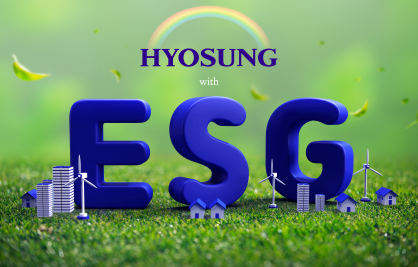
Concerns about climate change, global warming, and depleting resources have brought the idea of a new growth paradigm to the fore. Once foreign to many, the word ‘sustainable growth’ has become the uprising trend for future-oriented businesses. ESG, the acronym for Environmental, Social, and Governance, now has become a critical business milestone in their business direction. At the same time, it is also true that some businesses conveniently chose to jump on the bandwagon to claim that they have adopted ESG management just because sustainability is in fashion.
Here we have a company that has advanced our life for humanity; its business mission leading in various activities designed for environmental protection and carbon neutrality. That is no other than Hyosung, a leader in technology. To minimize its corporate footprint, Hyosung has been dedicated to sustainable growth by developing products and technology designed to facilitate the hydrogen economy and develop resource recycling technology and eco-friendly materials. And we at Hyosung stand by our numbers. Our environmental research and development investments are estimated to be over KRW104.3 billion (USD75 million), and our registered patents are over 3,310.
Hyosung’s mission to sustainable management, ‘Green Management Vision 2030’
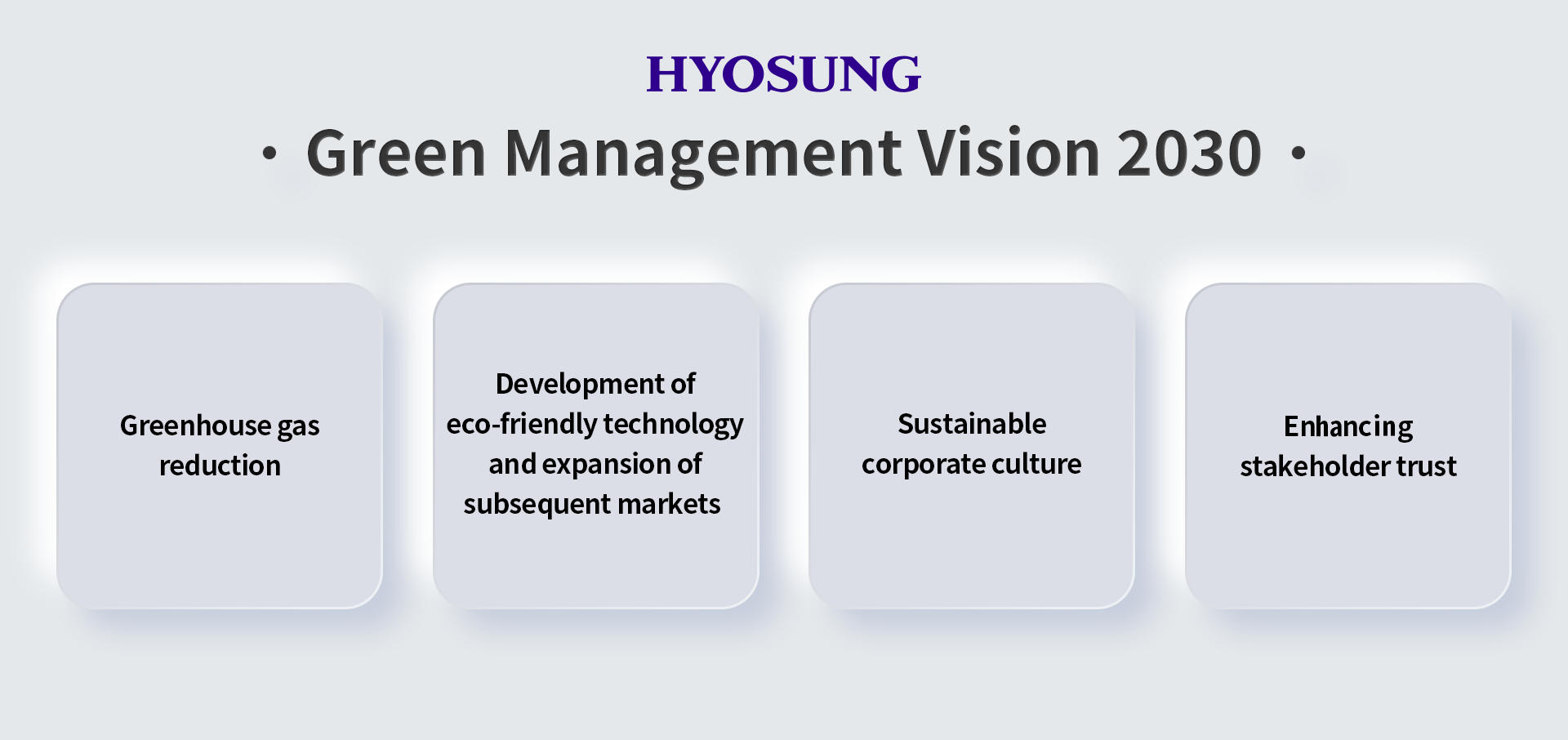
The most notable eco-friendly activities pursued by Hyosung include its initiative called ‘Green Management Vision 2030.’ The initiative has four targeted goals of greenhouse gas reduction, development of eco-friendly technology and expansion of subsequent markets, building a green company culture, and enhancing stakeholder trust. Hyosung has pursued subsequent strategies alongside its company-level climate change strategy for sustainable management.
1) Greenhouse gas reduction
In line with the nationally determined contribution target set forth by the ROK government in 2021, Hyosung has renewed its commitment to greenhouse gas reduction from a 20.5% cut in 2017 to a 14.5% cut in 2018 under its Green Management Vision 2030.
As such, the company has established a mid-and-long term reduction plan across the whole business encompassing planning, research, and production. On top of this, the risk management process on climate change is now in place to identify risks and opportunities that climate change brings and to update risk management status annually for the sake of ESG management.
2) Development of eco-friendly technology and expansion of subsequent markets
Based on the goal of developing eco-friendly technology and expanding subsequent markets under Vision 2030, Hyosung has put the utmost effort into R&D in technology and product development to secure new growth engines and accomplish sustainable growth. Let’s take a look at some of those examples.
■ A key renewable energy technology, energy storage system or ESS that enables storage of electricity for future use
Energy storage system or ESS, which helps save electricity for future use, is emerging as one of the most important facilities for the energy industry and electricity of the future as renewable energy power generation is growing in share. Hyosung offers a whole life-cycle service on ESS encompassing customized consulting, system building, and post-management. Our technology has received rave reviews from electricity powerhouses in Europe. Hyosung Heavy Industries signed a contract in 2021 to supply 50-megawatt energy storage systems to U.K. energy infrastructure investment company Downing LLP. With this deal, Hyosung is providing a total ESS solution to the UK that will involve designing, supplying, and a 10-year maintenance service. It is noticeable that the ROK company’s proprietary technology has been recognized by the UK, a country that has been leading the world’s efforts in carbon neutrality and a transition to renewable energy.
■ Insulating materials such as transformer and gas insulated switchgear replaced with green products
Hyosung Heavy Industries, a leading provider of electric equipment such as transformers and gas-insulated switchgear that are key to the electrical grid, has led the efforts to develop and commercialize green insulating materials. Hyosung has developed an eco-friendly transformer using ester oil as alternative insulation, reducing environmental impact, and enhancing safety against fire. Hyosung has been supplying this eco-friendly transformer to overseas markets such as Europe and the Middle East.
The company also developed 170kV Gas Insulated switchgear utilizing Novec gas blending in 2021 and plans to adopt it to newly built power transmission plants and projects designed to replace outworn facilities to reduce greenhouse gas emissions in electric power systems.
■ To build a large-scale liquefied hydrogen plant to expand the hydrogen business
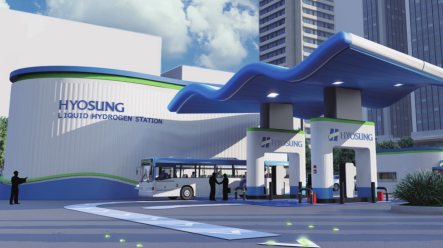
Committed to carbon neutrality, Hyosung Chemical and Hyosung Heavy Industries have been proactively pursuing the hydrogen business. With an existing hydrogen charging system, Hyosung supplies a charging system for passenger and commercial vehicles and plans to provide dedicated charging stations for heavy machinery in line with the hydrogen fuelization efforts for excavators and forklift trucks.
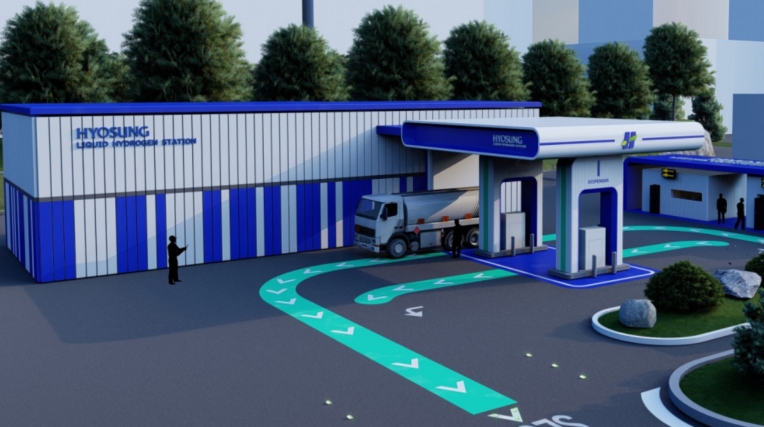
In addition, Hyosung is constructing the world’s largest liquefied hydrogen plant designed to improve the efficiency of hydrogen storage and transportation. Liquefied hydrogen offers much better efficiency in storage and transportation thanks to its higher density than that stored in the air. Hyosung plans to contribute to facilitating hydrogen mobility by proactively producing liquefied hydrogen.
In response to the growing trend in sustainable mobility and transition to the hydrogen economy, Hyosung joined hands with the world’s leading gas name Linde Group to build a 13,000-ton liquefied hydrogen plant by 2023 with an estimated investment of KRW300 billion (USD215 million). It will be built on the site of Hyosung Chemical’s Yongyeon factory.
■ TANSOME®, lighter but stronger than steel
Hyosung Advanced Materials developed TANSOME®, carbon fiber 10 times stronger than steel. It is one of the essential materials for producing fuel tanks for hydrogen vehicles. The carbon fiber-based high-pressure tanks are much lighter while promising better fuel efficiency. Hyosung sees a future where its TANSOME will be critical in green energy and the automobile industry where weight reduction is imperative.
■ Low carbon lyocell tire cords
Hyosung Advanced Materials has developed lyocell tire cords derived from woods used for high-speed vehicles for its durability. Using materials with minimum pollution impacts, unlike conventional materials such as rayon and nylon tire cords which generate pollutants including carbon bisulfide and sulfureted hydrogen, lyocell tire cords offer 30 percent lower greenhouse gas emissions.
■ Eco-friendly engineering plastic material, polyketone
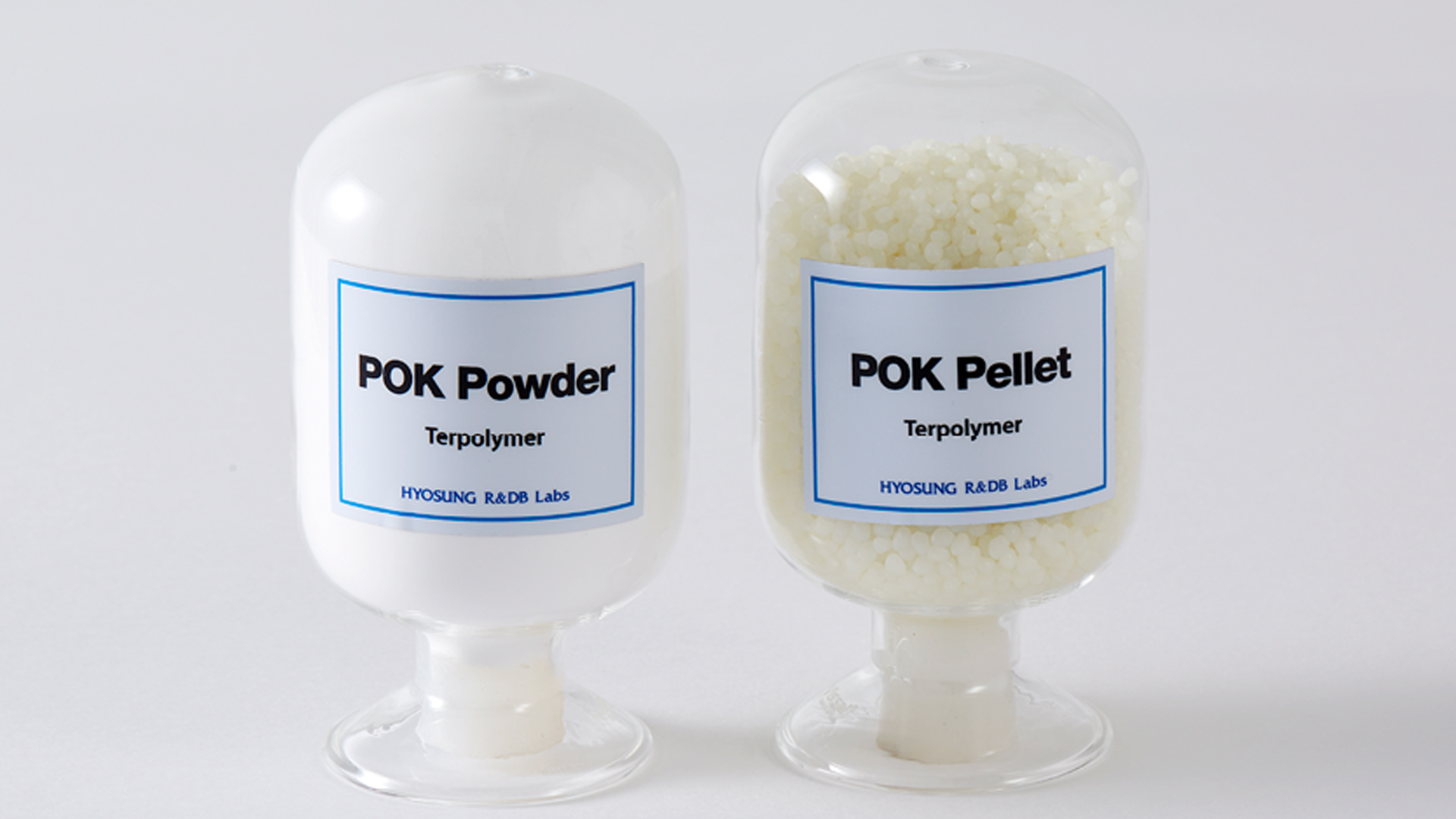
Based on its proprietary technologies developed in 2013, Hyosung Chemical produces engineering plastic POKETONE™. Made of carbon monoxide (a leading cause of air pollution), Hyosung’s polyketone uses 0.5 tons of carbon monoxide for 1 kg of Poketone production. The material is approved by the US FDA for its non-toxic characteristics and thus has been widely used for kids’ toys, food processing conveyors, and cosmetic packaging. It is now being adopted in new sectors such as automobiles, electric and electronic gear, and drilling pipes.
Especially, Polyketone is safe and durable for its impact and abrasion resistance, and ductility. It is a semi-permanent material that doesn’t require the replacement of components and thus offers higher sustainability than general or disposable plastic materials.
As a leading eco-friendly plastic material, Polyketone also offers lower global warming potential (GWP) compared to other engineering plastics and is proven through LCA or life cycle assessment and other external reviews to be effective in reducing CO2 emission. Hyosung Chemical has expanded its application to broader areas such as building materials, automobiles, household items, and leisure goods.
■ Recycled polyester yarn created from post-consumer PET bottles, regen®
With plastic waste emerging as a global issue, Hyosung TNC developed 100 percent recycled polyester yarn from discarded PET bottles ‘regen® polyester’ back in 2008. The textile powerhouse Hyosung TNC’s regen® polyester offers the same level of quality and performance as conventional polyester materials. It is loved by leading fashion names worldwide for its outstanding quality and stable supply thanks to Hyosung’s extensive global network. It also offers 60 percent less CO2 emissions than other polyester products.
Hyosung TNC has been producing ‘regen® ocean nylon’ since 2007, a recycled nylon yarn from fishing net waste that accounts for a large percent of ocean waste. These eco-friendly yarns, regen® polyester and regen® ocean nylon, contribute to sustainability and circular economy by dramatically reducing landfill waste and CO2 emissions. As a leader in the circular economy for the textile industry, Hyosung offers global best practices in quality and stable supply.
■ Bio-based spandex
The global number one spandex provider Hyosung TNC learned from the Life Cycle Assessment that materials before they are put into the manufacturing process, have the biggest environmental impact. To address this, the company has developed bio-based spandex to supply them for global leading fashion brands. It is currently working on biodegradable polyester yarn development as part of its effort to diversify its bio yarn portfolio.
3) Sustainable corporate culture
In 2021, Hyosung ran an internal idea competition for energy saving and greenhouse gas reduction. Out of the 211 ideas submitted, ranging from energy consumption saving in business sites to product development, 10 passed the thorough deliberation process, and the selected ones have all been implemented to reduce greenhouse gas emissions.
Assembly lines at Hyosung TNC are all in the process of transitioning to low carbon energy consumption. It uses waste supplied from incineration facilities nearby as a renewable energy source while using biogas produced from an anaerobic digestion system installed in its factories.
Hyosung also ran an internal campaign last year to do away with disposable goods in the workplace. Since 2021, paper cups for water coolers in the company have been removed, and instead, it supported employees’ purchase of tumblers. In 2020 alone, it is estimated that around 190,000 paper cups were used at the headquarters of Hyosung TNC. Thus, we believe that by simply cutting down on our use of paper cups daily, we can reduce our CO2 emissions by up to 2 tons per annum.
4) Enhancing stakeholder trust
Hyosung has shown an outstanding performance in the CDP (Carbon Disclosure Project) scores, the most trusted assessment of businesses’ climate change response. In the 2020 CDP Climate Change Awards, Hyosung Advanced Materials was awarded Carbon Management Honors Club, an award for the top five performers, and Carbon Management Sector Honors for the top-notch CDP scorers in respective sectors.
CDP is a not-for-profit organization based in London, UK, that discloses environmental impact information such as climate change strategy, CO2 emission, and carbon management of major listed businesses in 91 countries.
What we have here is just part of a much larger story regarding Hyosung’s commitment to sustainable management. We at Hyosung believe the future for a fully sustainable Hyosung is just around the corner, with all members of the Hyosung family being committed to a better life for humanity. Hyosung continues to trailblaze daily to honor its carbon reduction commitment to identify sustainable new growth engines and protect our environment.